Making a living in the death trade: What does it take to be a funeral director in Singapore?
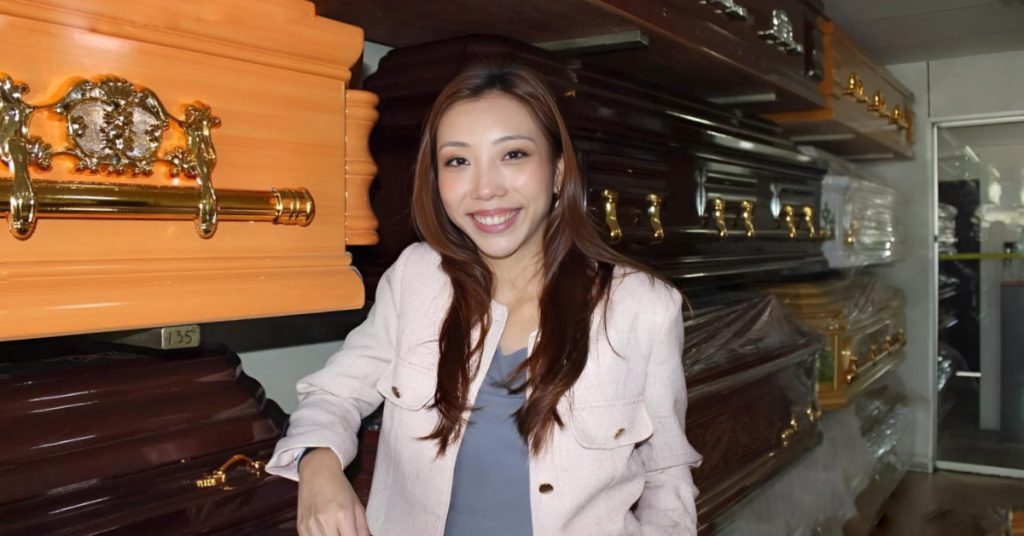
Losing a loved one is never easy, but the taboo surrounding death makes it difficult to have open conversations about it.
However, one funeral director aims to destigmatise the funeral industry, and writing her first book is her first step.
We’ve read her book Echoes of Farewell and spoken to Harmony Tee, the author and founder of Harmony Funeral Care, to learn more about what it takes to be in the death trade and the lessons she has learnt from her seven years as a funeral director.
There is no textbook to being a funeral director
Growing up, death was not a strange subject for Harmony. Her grandfather established a funeral company, Hock Hin Undertaker, 60 years ago upon arriving from China, and she learnt about the industry through her father, who took over the business together with his brothers.
“My grandfather passed away a year before I was born, so I never had the chance to witness how he ran the family business,” said Harmony.
But Harmony did not get her start in the funeral industry. After graduating with a degree in Accountancy, she worked as an auditor at Ernst & Young and had the opportunity to work in the United States.
However, all that changed when she got the news that her father was diagnosed with kidney failure, and there were talks of closing her grandfather’s shop. “After much thought, I decided to take a leap of faith and step into the funeral industry, giving myself a one-year timeframe to either succeed or move on.”
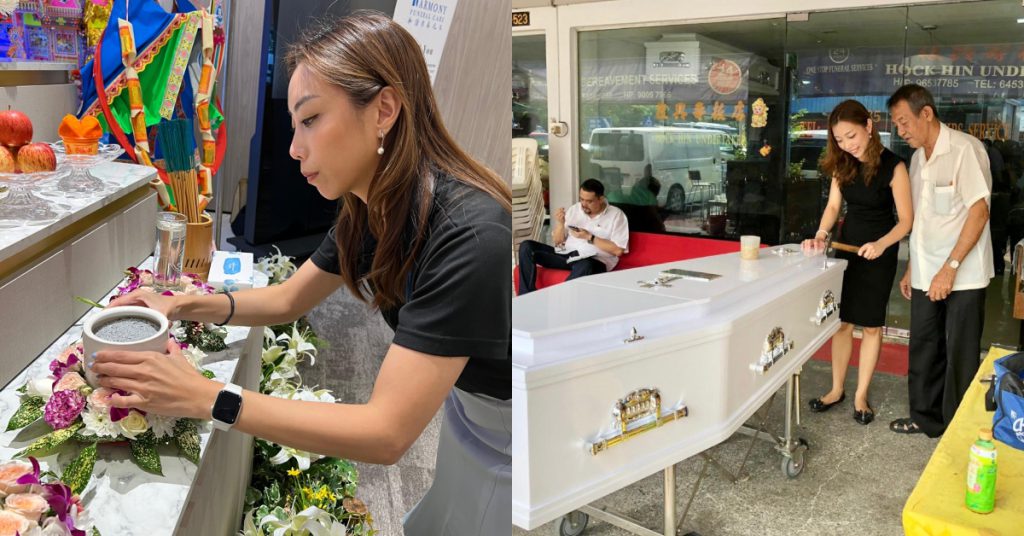
From brushing up on her dialects to better communicate with her older colleagues and working daily to learn how funerals are conducted for different religions, to taking a pay cut and earning S$2,000 monthly, the learning curve was incredibly steep for the then-25-year-old.
Harmony added that in the past, workers followed what was taught and worked based on their past experiences, leading to a lack of standardised processes. “This lack of structure may be tough for people who enter the industry hoping for a guideline on how things are to be done.”
The career switch also heavily impacted her social life. Because death has no timing, it became challenging for her to set aside time to meet with friends and family.
“One or two friends got really angry with me for standing them up in my appointments with them due to work, and hence, I slowly stopped making plans,” recalled Harmony.
Why she stayed after the infamous mix-up
However, it was not until 2020 that Harmony encountered her biggest crisis that, unfortunately, became a high-profile case in Singapore—one of her employees mixed up and cremated the wrong body, sparking outrage from the public, media, and funeral directors.
We asked Harmony how she took responsibility for the employee directly involved in the mix-up, and here’s what she said:
The employee was a family friend, and while the mistake he made was serious, I reminded myself that we are all human, and mistakes are inevitable. What truly matters is how we learn, rectify, and grow from them. I encouraged him to stay and work through the challenges together, hoping we could move forward from that chapter. However, he was deeply affected by the incident and felt that this industry was not his calling. As a result, he chose to leave. Even so, we have remained in touch to this day.
Despite the challenges, Harmony refused to throw in the towel. She shared that the incident pushed her to reflect on the reasons she chose to join the industry—to bring greater transparency to the industry’s practices and encourage open conversations about death.
This led Harmony Funeral Care to launch Funeral Fridays, a weekly online initiative to educate the public on death-related matters.
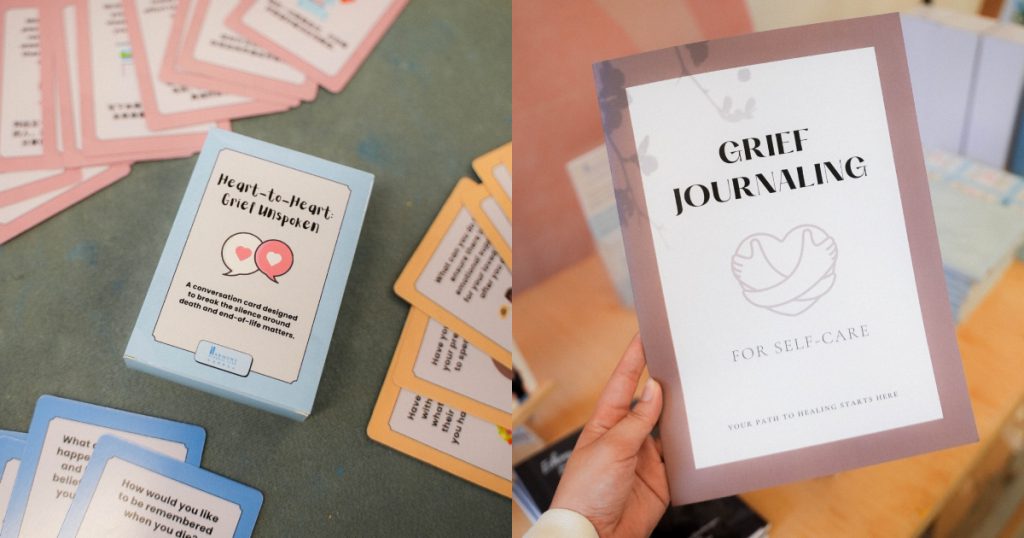
Lesser-known facts about the funeral industry
The death trade is not for everyone, and Harmony can attest to this as some entered the industry only to leave upon learning the often gruesome realities of the job.
In particular, she mentioned the need to be in close physical contact with deceased bodies, including unnatural deaths such as suicides or traffic accidents—and if you are an embalmer, having to manoeuvre the corpses can be physically tiring.
“I felt it was important to provide a realistic view of what working in the funeral industry entails,” she added. Nevertheless, she shared the career path that one might expect once they enter the trade:
- Operational – Pallbearers (someone who helps to transport the corpses and coffins)
- Middle management – Emceeing, learning about the different rites and rituals according to religions, as well as the logistics needed
- Higher management – Sales, case managers (someone who oversees the funerals)
For customers, did you know it costs around S$650-S$1,800 to hold a funeral at a funeral parlour? And that different crematoriums offer different prices? Singapore has three crematoriums, and here’s how much it costs for a single adult cremation:
- Mandai Crematorium and Columbarium Complex: S$100 minimum
- Bright Hill Temple & Tse Tho Aum Temple: S$330-S$450
The average cost for a funeral depends on various factors such as the number of days, venue, and the decedent’s religion. However, Harmony emphasised that families should look beyond costs and consult with their funeral director to make the most informed choices.
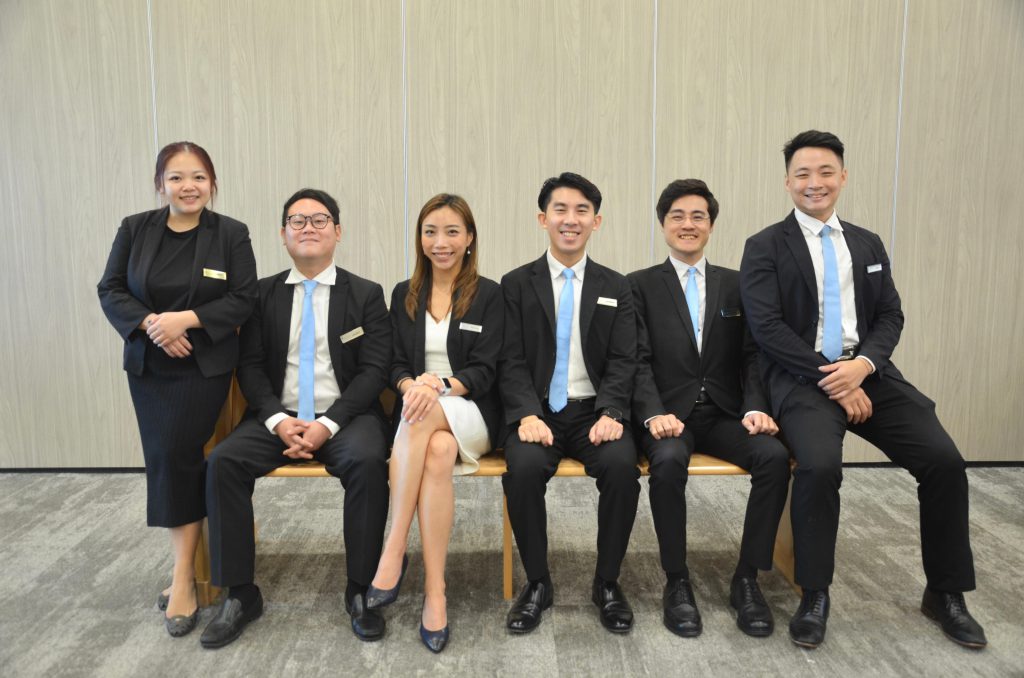
When asked how she helps her staff deal with compassion fatigue and the harsh realities of the trade, Harmony believes in being honest when assessing whether someone is suited for the industry.
She explains that she focuses on finding the root cause behind a team member’s short-term emotional or physical exhaustion and will recommend having “a short break” to recharge.
“However, if someone consistently struggles to cope with the demands of this field, it might be a sign that this career path is no longer suitable for them. I would encourage them to reflect and reconsider their options, as it’s important to acknowledge when their season in this line of work has come to an end—for their own well-being and the quality of service we provide,” explained Harmony.
When asked how the funeral industry will change, Harmony predicted that society may grow a preference for simpler funerals, and that traditional religious rites may phase out gradually.
That said, she pointed out that the shift towards pragmatism might also result in a loss of cultural heritage and the art behind these ceremonies. Striking a balance would be a challenge that must be thoughtfully addressed as the industry evolves—to which her book would serve as a “time capsule.”
Life is short—the sooner you find out what you live for, the better and easier it is for you to leave with no regrets. Leave ah, not live! Because how you live in the world ultimately depends on how you want to leave this world.
Harmony Tee, founder of Harmony Funeral Care and author of Echoes of Farewell
- Learn more about Harmony Funeral Care here.
- Read more stories we’ve written on Singaporean startups here.
Also Read: How a health scare led this S’porean to make jewellery that helps people cope with death
Featured Image Credit: Vulcan Post
She opened a Kuching restaurant serving up S’wakian food 3 yrs ago, now it’s grown to S’pore
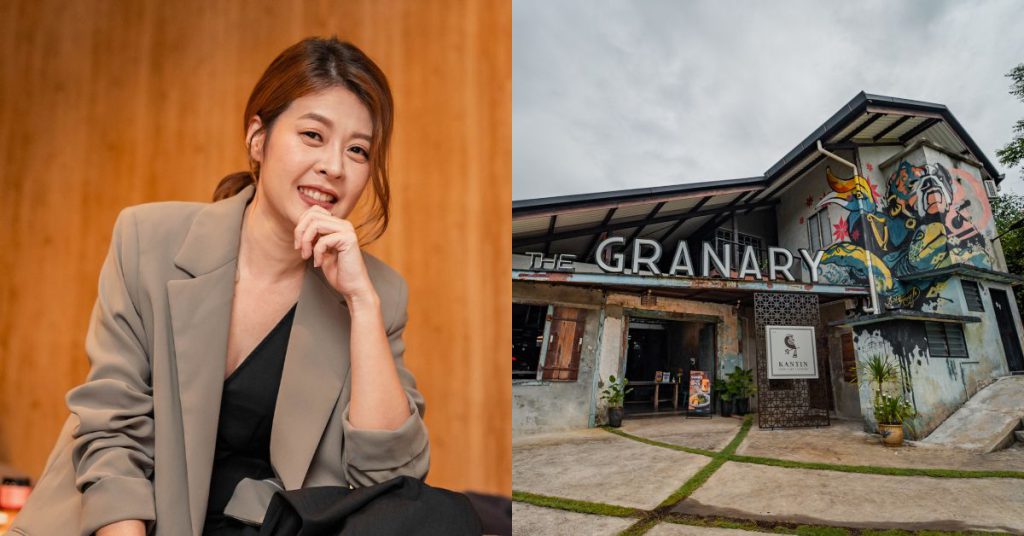
In 2021, Carmen Toh, alongside a group of artist-entrepreneurs, embarked on a culinary journey that was as ambitious as it was heartfelt. Their shared passion for food, culture, and storytelling culminated in the creation of KANTIN in Kuching.
The name itself, a nod to the nostalgic Malaysian school canteens, captures the essence of community, joy, and cherished local flavours.
For Carmen, who has a background in media and journalism and a deep-rooted love for Sarawakian culture, KANTIN was more than a restaurant—it was a platform to educate, inspire, and preserve heritage.
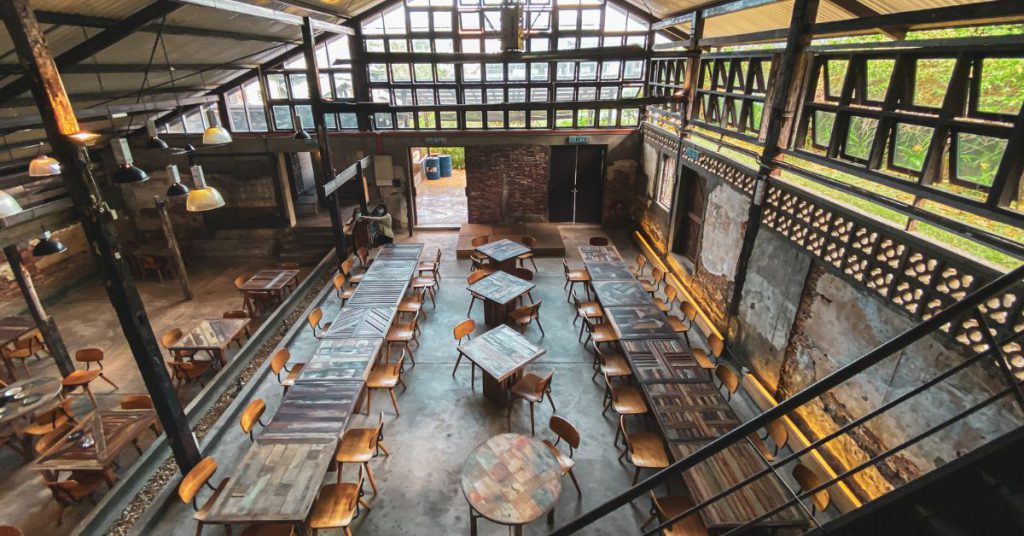
“Food is an entry point,” Carmen noted. “It’s a way to connect people and share stories. Through taste and experience, we bring culture to life.”
KANTIN wasn’t born out of a pivot but as an extension of Carmen’s earlier venture, Sarawak Eye, a creative agency that specialised in branding for corporate and government clients.
With a team of talented individuals excelling in writing, photography, film, and animation, Sarawak Eye promoted Sarawak’s rich cultural heritage for over a decade.
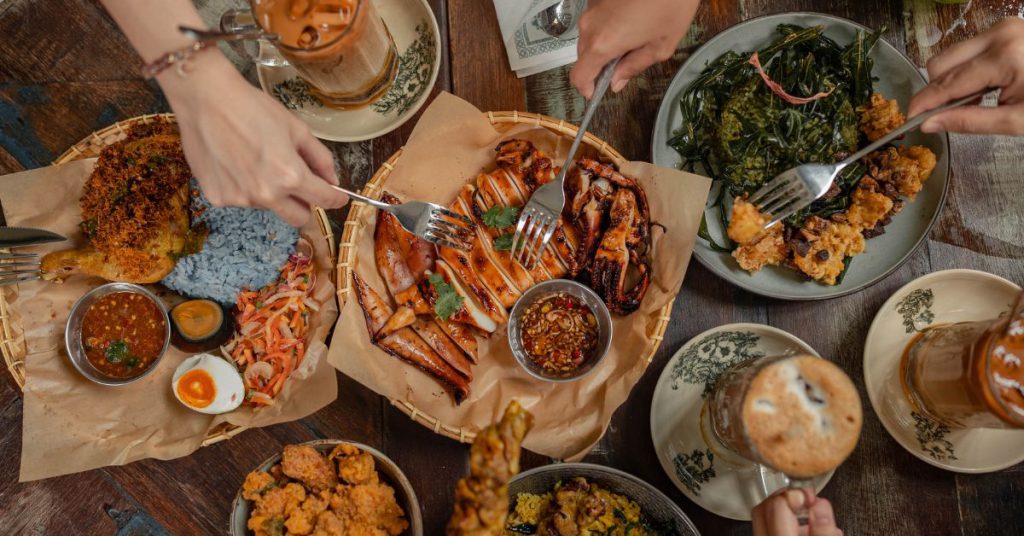
The transition to the food and beverage (F&B) industry felt natural, as Carmen and her team saw food as another powerful medium for storytelling.
Artists turned restaurateurs
The co-founders of KANTIN are a diverse group of creative minds from various artistic fields, united by a love for food.
Emily Yii, one of the co-founders and a talented director, now manages KANTIN’s Singapore outlet (their first international outlet). Her background in filmmaking brings a unique perspective to the team, blending creativity with operational expertise.
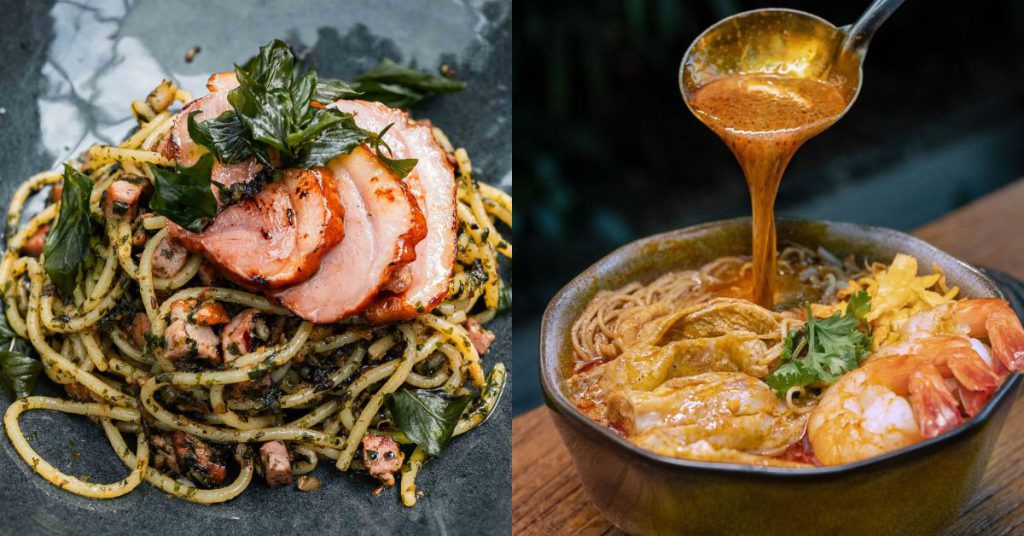
“We’re not traditional businesspeople,” the founder shared with Vulcan Post. “We’re artist-entrepreneurs with high standards and a meticulous approach. Everything we create reflects the kind of experience we’d want for ourselves.”
This philosophy is evident in every aspect of KANTIN—from its menu to its ambience. The team’s artistic sensibilities and playful creativity often shine through, as seen in their viral April Fool’s Day prank desserts, such as the dish sponge and cat poop-themed treats that had everyone talking.

Singapore’s gateway to Borneo
In a bold move, KANTIN expanded internationally to Jewel Changi Airport in Singapore, with the founder claiming that it’s the first Bornean concept restaurant in the city-state. Singapore, with its global audience and high standards, was the perfect stage to showcase the flavours of Borneo.
“Jewel Changi chose us over other big brands because of our uniqueness,” Carmen explained. “We bring something different to the table—literally.”
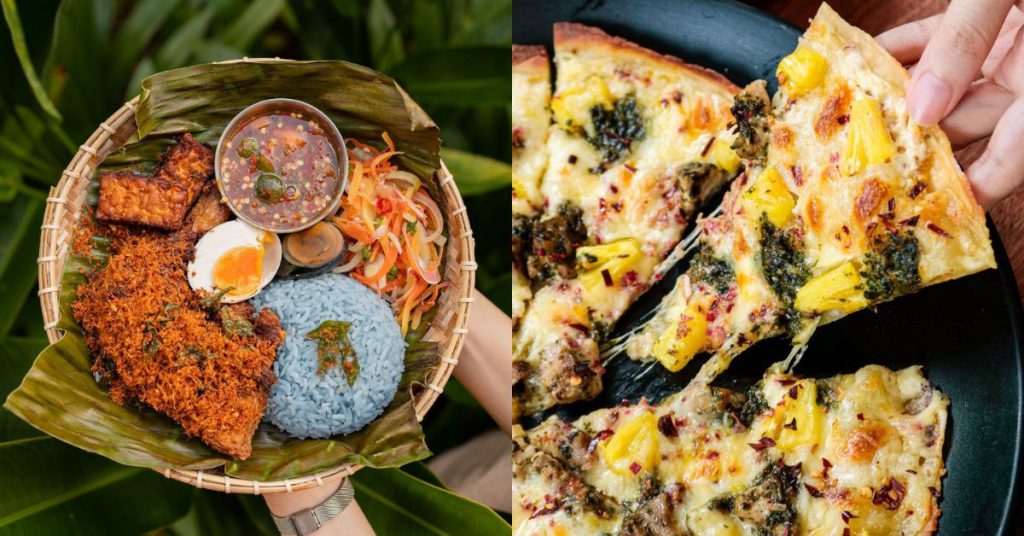
She added that KANTIN’s signature dishes, such as the Rainforest Fried Rice, resonate deeply with customers. This meat-free, vibrant green dish is a testament to their innovative use of unconventional Sarawakian ingredients like jungle produce and special herbs.
“When you taste our food, it’s like experiencing the flavours of the forest,” she said.
Challenges and triumphs
As with any venture, KANTIN’s journey has not been without challenges. Ensuring consistency in food quality across locations and finding the right staff to align with the company’s culture are ongoing hurdles.
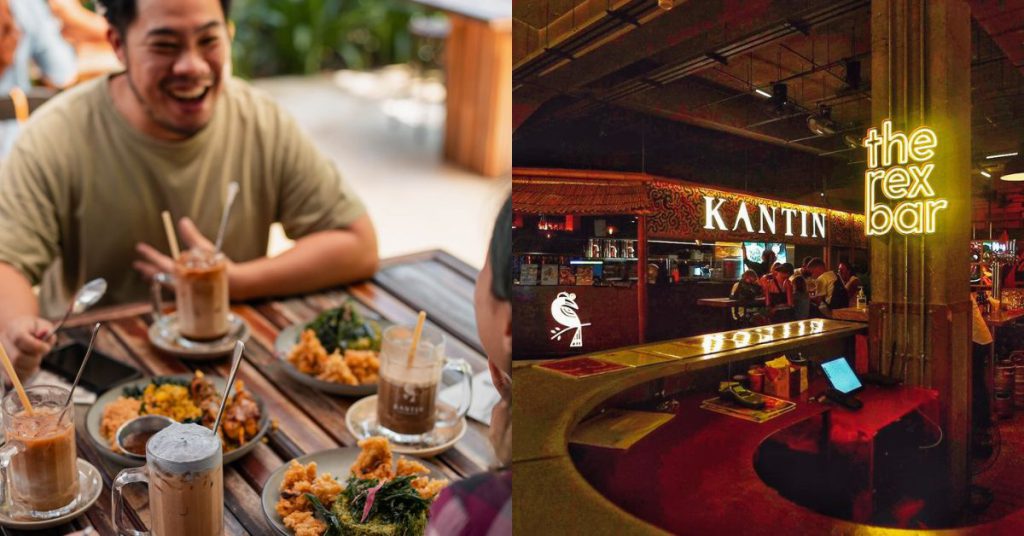
Yet, Carmen and her team remain steadfast, guided by their values and a shared vision.
“It’s all about teamwork,” she emphasised. “There’s no single celebrity figure here. Our unity helps us maintain the consistency and authenticity that define the KANTIN experience.”
This commitment has paid off, with KANTIN recently being nominated as one of Malaysia’s Best Restaurants 2024 by the World Culinary Awards.

Beyond accolades, it’s the heartfelt feedback from customers that truly drives the team. From picky eaters devouring their greens to tourists declaring it the best meal of their trip, these moments are what make the journey worthwhile, she said.
Looking ahead
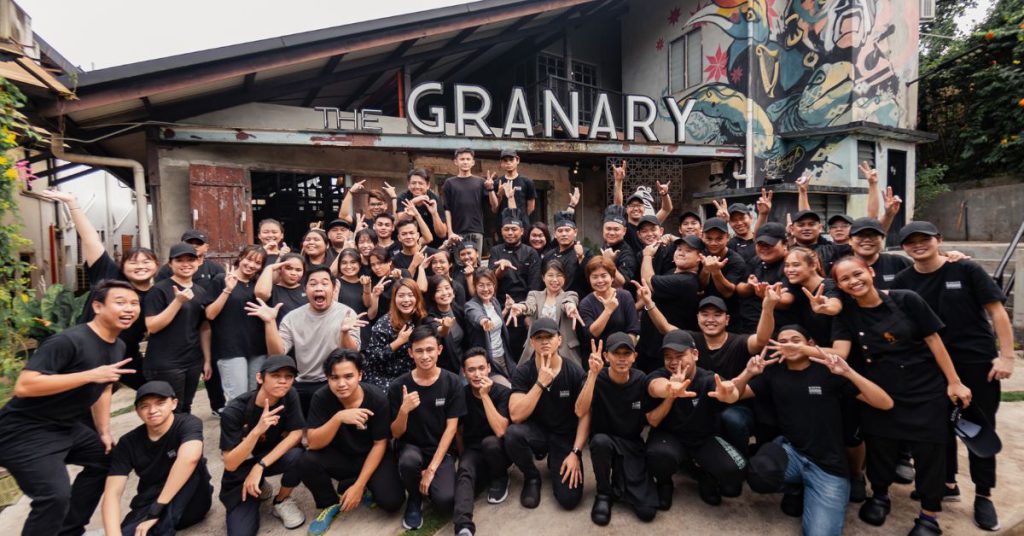
KANTIN’s journey is far from over. With its Jewel Changi outlet serving as its gateway to the world, the team is already exploring the possibilities of bringing Bornean cuisine to new international markets.
Their commitment to using unique Sarawakian ingredients and authentic cooking methods remains unwavering, thanks in part to partnerships with organisations like Sarawak Trade & Tourism Office Singapore (STATOS), which help source essential ingredients like Gula Apong.
“Persistence and belief have been our greatest lessons,” Carmen reflected. “Sarawak is like a diamond, and KANTIN reflects that brilliance. The possibilities are endless.”
As KANTIN continues to grow, its mission remains the same: to connect people through food, culture, and storytelling. For Carmen and her team, every plate served is not just a meal but an experience, a story, and a celebration of Sarawak’s rich heritage.
- You can learn more about KANTIN here.
- Read other articles we’ve written about Malaysian startups here.
Also Read: 3 benefits your tech startup will gain from joining MRANTI’s Supercharger Series, explained
Featured Image Credit: KANTIN
This expat opened a Mont Kiara eatery to popularise a lesser-known chicken dish from Korea
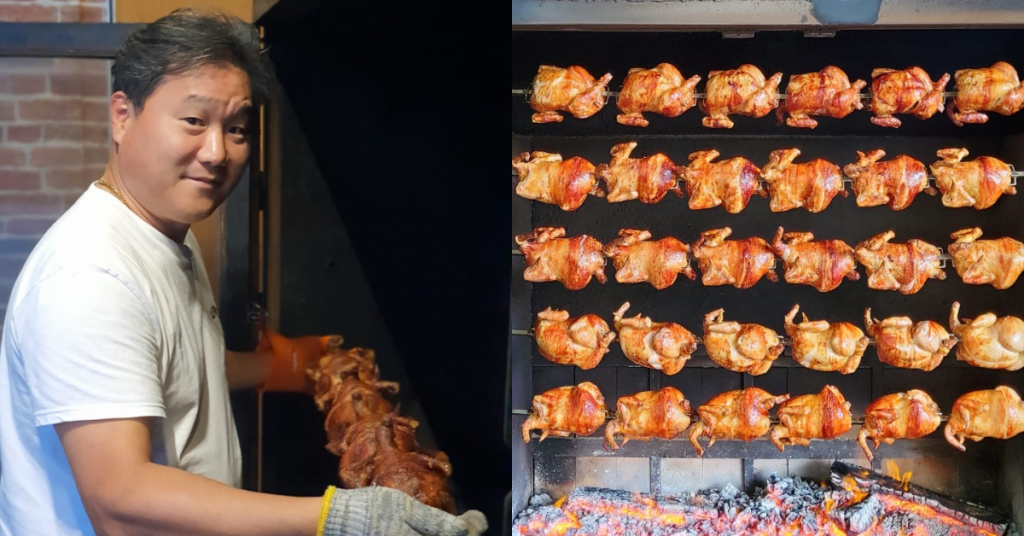
If you think of Korean chicken, the first thing that comes to mind is likely fried chicken.
From K Fry to Kyochon, many brands are now present in Malaysia to offer the crowd-favourite dish.
However, before Korean fried chicken was a thing, it was actually something called tongdak-gui that popped off in South Korea in the 1970s.
These Korean-style roasted chickens aren’t commonly found here in Malaysia, though, making a fairly new restaurant by the name of 360 Chicken quite the unique spot.
Filling in a market gap
Hailing from South Korea, Ray Lee has been living and working in Malaysia for the past 20 years.
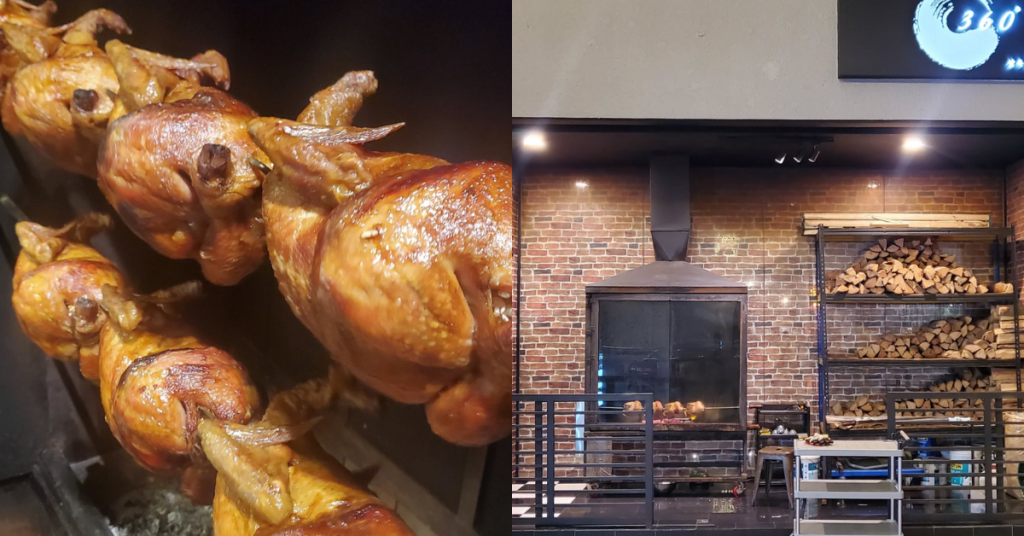
Up until last year, the 50-year-old had been working in the ecommerce industry.
After two decades in Malaysia, Ray witnessed the increasing popularity of Korean culture and subsequently, Korean food.
However, many of these restaurants ended up offering similar concepts and menus.
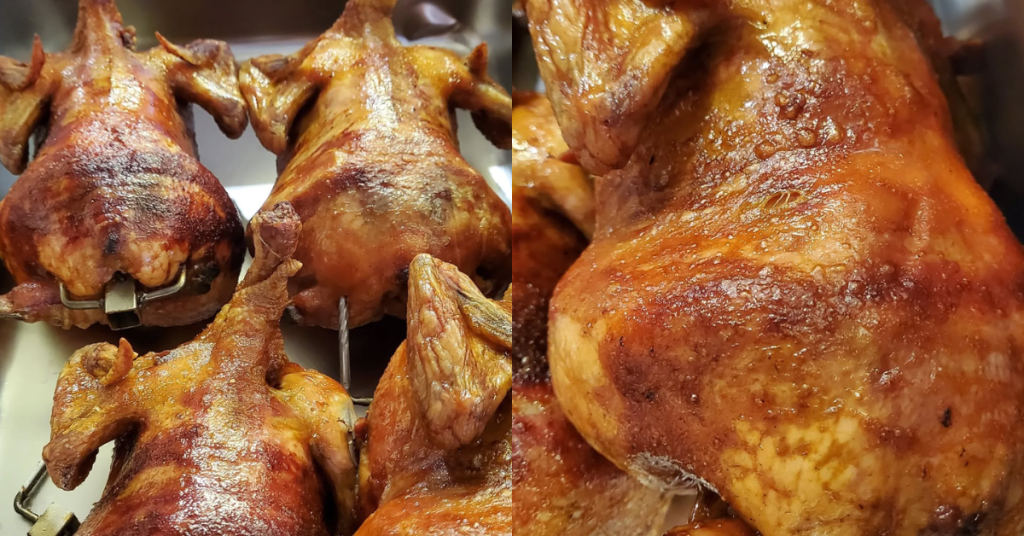
“With K-culture introducing Malaysians to a wider range of Korean food, I saw an opportunity to offer something different,” he determined.
So, in March 2024, Ray launched his very first restaurant in Solaris, Mont Kiara.
Bringing in global techniques for a local audience
It wasn’t just an impromptu decision to open a restaurant, though.
“To open my restaurant, I personally went to Korea and apprenticed under a master wood-fired roaster with 25 years of experience,” Ray revealed.

360 Chicken uses locally sourced firewood—mangrove wood, to be exact. Meanwhile, all the equipment and techniques were brought from Korea.
The Muslim-friendly restaurant uses halal-certified whole chickens, which get marinated for over 24 hours in a non-alcohol marinade.
From there, the chicken gets slow-roasted over more than two hours, then gets stuffed with ginseng, garlic, ginkgo nuts, jujubes, and sticky rice, making it packed with nutrients and flavours.
“Due to the multiple processes and premium ingredients involved, our prices are slightly higher than regular chicken,” he clarified. “We recommend trying our original to experience the pure taste of our chicken.”
Popularising the dish across Malaysia
Less than a year in, Ray shared that 360 Chicken has already found some stable footing, and has welcomed many supportive customers.
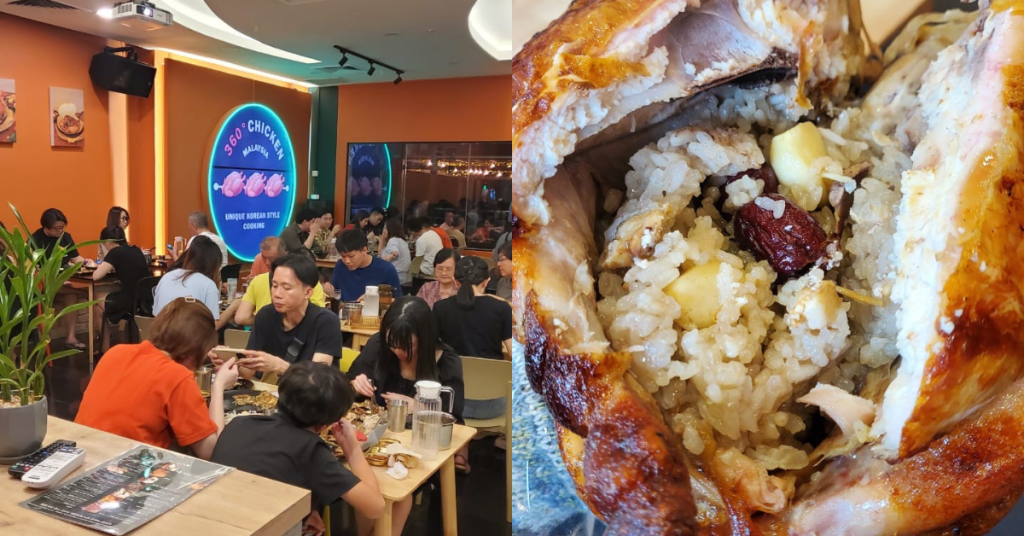
“While we’ve experienced a recent decline in overall sales due to the economic downturn, I believe that business will soon return to normal,” Ray shared.
Mont Kiara is home to many Korean restaurants, though, which could make business a little more competitive for 360 Chicken. However, that’s not something Ray is worried about.
“It’s not about competition, it’s about collaboration,” he emphasised. “I believe a thriving local economy benefits everyone, including my business.”
Plus, his venture has quite the unique concept, and by that virtue, the founder believes it will grow a loyal customer base over time.
After all, stuffed roast chicken is still quite a niche offering with lots of preparation needed, so he doesn’t believe it can become a widespread trend in Malaysia quickly.
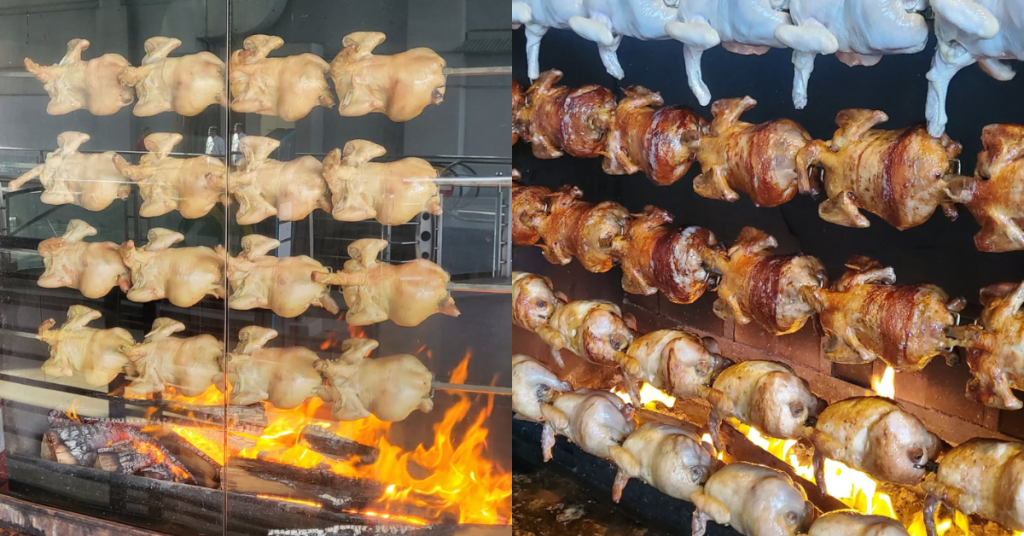
However, leveraging their store’s experience and know-how, Ray plans to open 10 more locations of 360 Chicken nationwide.
This would be a great feat and a recognition of the hard work that Ray has put into the business.
“It was challenging from the start, from acquiring the necessary skills to setting up the equipment,” he revealed. “I simply persevered, one step at a time. I am most proud of having built my own business in a foreign country and providing special Korean cuisine to Malaysians.”
Also Read: 5 reasons Tokyo makes an ideal launchpad for M’sian & S’porean startups to scale globally
Featured Image Credit: 360 Chicken
5 insider insights from Cradle’s PLUGIN conference that M’sian entrepreneurs should know
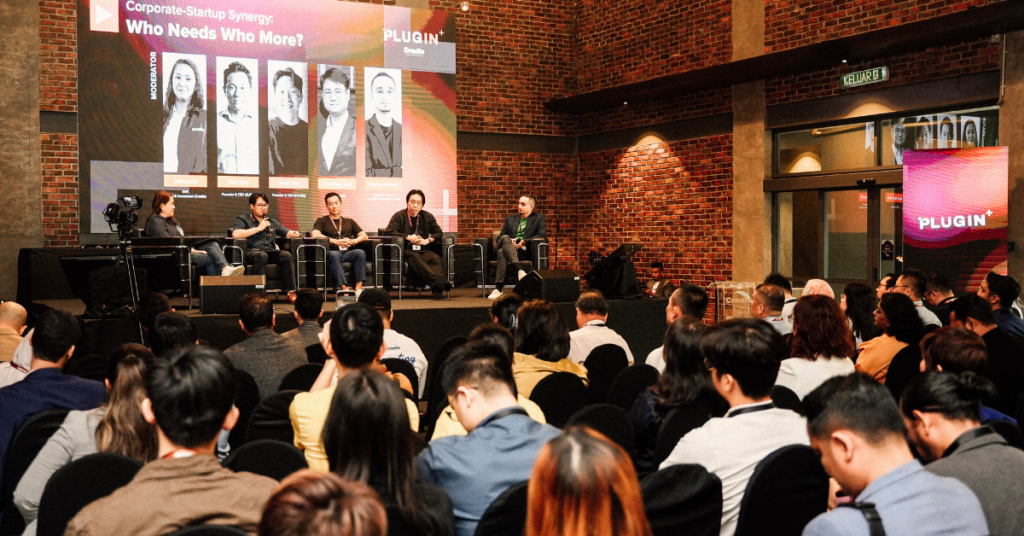
[Written in partnership with Cradle, but the editorial team had full control over the content.]
Looking back at 2024, there have no doubt been many insightful conferences and events in the startup and business world.
From the iconic KL20 Summit to the recent Startup Week Malaysia, there have been many learnings to go around.
At this point, though, you might be feeling burnt out on full-fledged conferences and large-scale events. Thankfully, Cradle’s recent and inaugural PLUGIN conference felt like a cosy and intimate gathering, albeit one that brought in lots of great startups, investors, and policymakers.
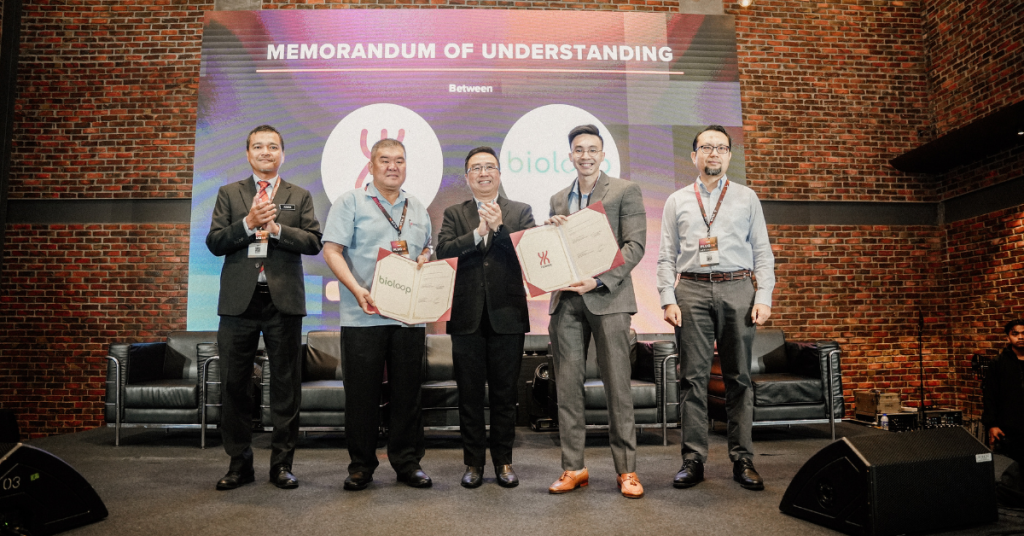
The event even saw an Memorandum of Understanding (MoU) signing by homegrown biotech company Bioloop and Yenher Holdings, as witnessed by Yang Berhormat Tuan Chang Lih Kang, our Minister of Science, Technology & Innovation Malaysia (MOSTI).
If you weren’t able to make it, here were some of the highlights from the one-day event.
1. If you want to work with a corporate, you must have a “champion” on the inside
The first panel of the day had been all about corporate-startup synergy. Panellists included both startups as well as corporates to attest to both sides of the equation.
Namely, the panel included Mark Koh from SUPA, Derek Toh of Hiredly, Azrul Reza Aziz from MARII, and Hassan Alsagoof from Grab. The conversation was moderated by Cradle’s very own Juliana Jan.
One thing that the speakers agreed upon was the importance of having a “champion” or “sponsor” on the corporate side of things.
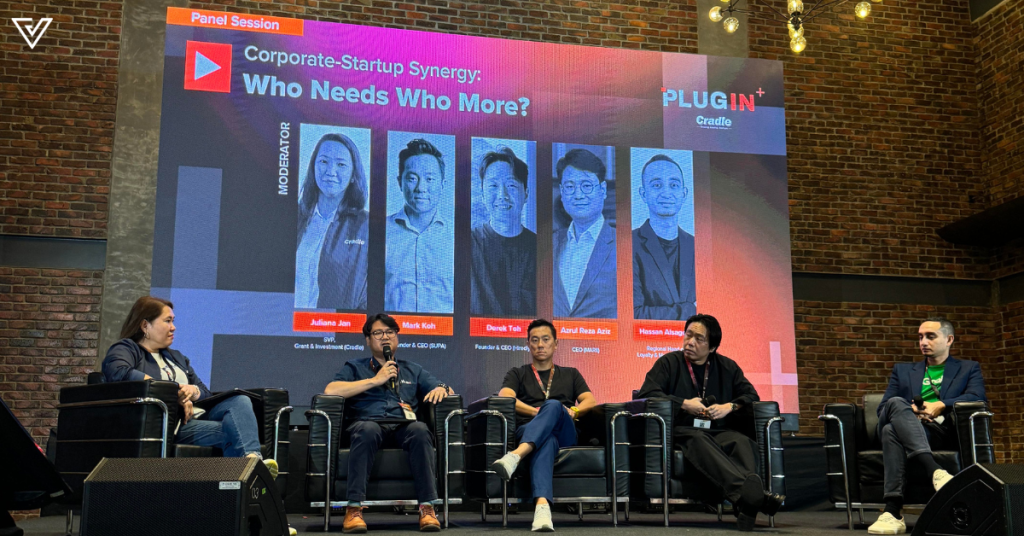
This refers to someone who strives to understand your startup, digests that information, and then communicates that to other decision makers in the corporate team. It’s someone who will continually speak up for you and connect you with the corporate.
When your champion is a C-suite level executive, then you’re golden, as many decisions in the corporate world are very top-down.
But that doesn’t mean you’re screwed if you don’t have access to the C-level. You just need to identify someone who has the capacity to help you, and engage with them frequently.
2. Having good endurance and a good runway is key for startups
This might sound like a given, but it’s extremely true especially when you’re aiming to work with bigger companies.
As you may know, bigger corporations take a long time to make decisions. Confidence also takes time to build with them, as they’re all about mitigating risks.
This means that at the end of the day, you must be in it for the long run, and you cannot be relying on the corporate angle working out.
Startups must consider any corporate handouts as a bonus instead of banking on it, and instead focus on properly running your business. In other words, the Business As Usual (BAU) elements must be down pat.
3. More than financial support, grants will teach you accountability
In case you didn’t know, a grant isn’t necessarily just free money. Well, it’s true that in a way it’s free money since it’s not tied up with any equity or stake in the company, it’s something you have to work hard to earn—and harder yet to keep.
During the second panel that was focused on grants and incubators, Pandai founder and CEO Khairul Anwar shared how grants are given out on a milestone basis. Basically, startups don’t get the bulk of the money in a lump sum, but rather, it’s usually on a quarterly sort of basis.
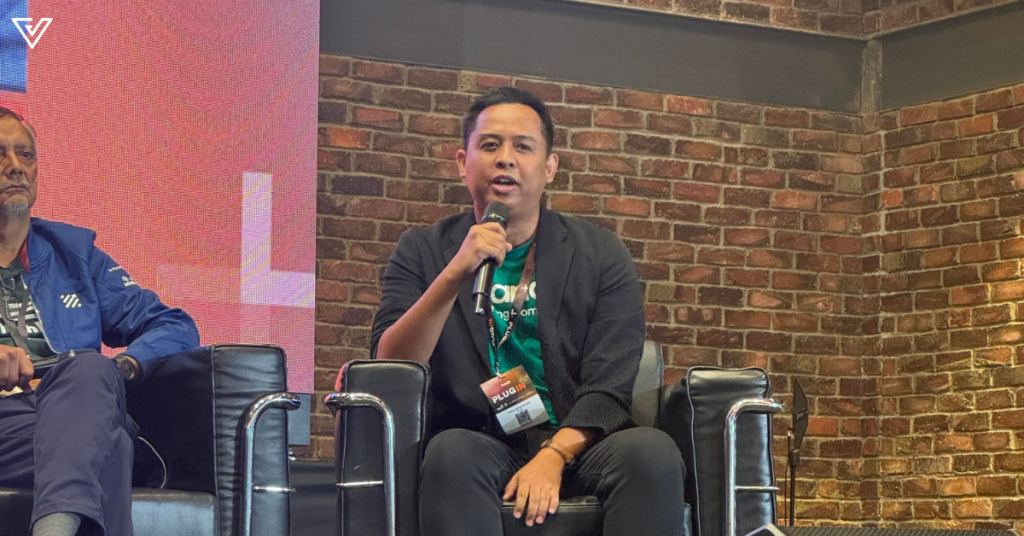
There’s also a lot of compliance matters. Meaning to say, you cannot use that grant money to pay yourself or your staff.
Rather, it’s earmarked for specific tasks, and you cannot perform those tasks yourself even if you’re skilled in it. For instance, the Pandai team could do web development on their own, but to utilise the grant, they needed to hire a third-party developer.
While this might seem like something tedious, the silver lining is that it teaches startups to be very accountable and compliant, gearing them up for future success.
So, keep that in mind before you apply for a grant, and try to look to the positive sides when learning how to navigate all the paperwork and red tape involved.
4. Governance is key as you grow your startup
Perhaps something that might be overlooked in the “ESG” trifecta is the “G”—governance.
Similar to the last point about grants, there’s actually a lot of regulations that startups have to navigate, especially as they grow.
Startups typically have a more “cowboy” way of doing things, but ultimately, there are a lot of guidelines they must follow, especially if you want to play in the big leagues. Thus, paying attention to governance from the get-go can help set a business up for success.
During the panel on IPOs and acquisitions in Malaysia, Elaine Lockman, the CEO & Co-Founder of Ata Plus, shared that governance is key during exits. Startups will need to have a lot of information on hand to meet certain criteria.

Look at the whole shebang that WeWork went through back in 2019 as it was filing for IPO. That just goes to show how bad governance will lead to a whole business’ demise.
During the conference, we also heard from legal experts in the Cradle team that a key reason why startups fail is actually due to governance issues. Based on their data, there’s one of three reasons that startups flounder, and that’s either from shareholder disputes, having no proper structure, or no proper bookkeeping.
So, if you’re running a startup and think that you can just do whatever you want until you grow bigger, think again.
5. It comes down to basic business sense
One big theme that we noticed during the conference was the emphasis on basic business fundamentals.
As pinpointed during the final panel of the day, which touched on venture capital in Malaysia, it all comes down to dollars and cents.
In the context of Asia especially, the Silicon Valley playbook doesn’t quite work. Investors like to see a more traditional approach whereby the unit economics simply make sense.
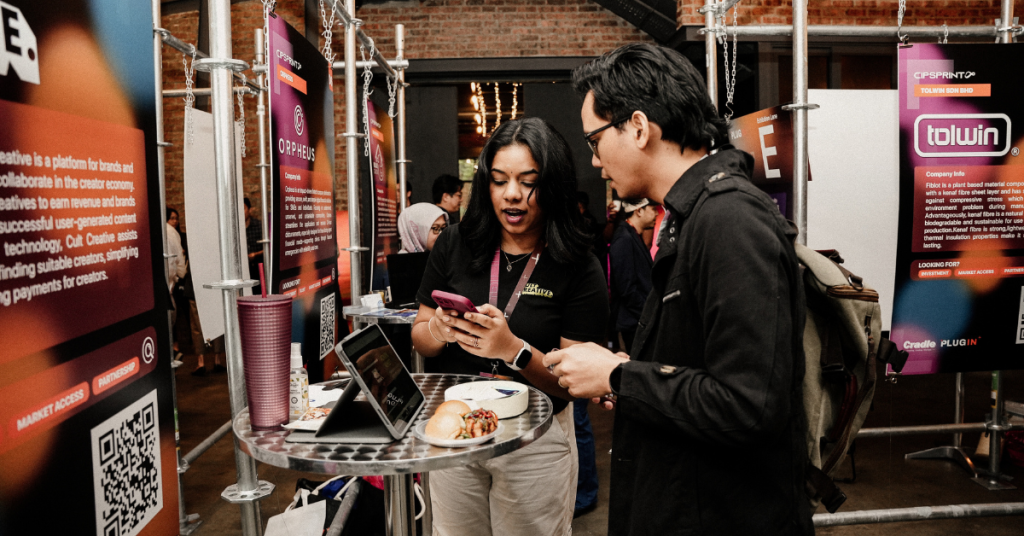
Yes, this might mean that regional startups might have a harder time getting off the ground, but it also means that they are more sustainable and have better endurance.
So, really, it’s all about running a business, and running it well. Have the stamina to see things through, and do things by the book. While these pieces of advice might not seem sexy, they’re necessary.
An optimistic future for Malaysia
Ever since the KL20 summit, or maybe even before, there has been a sense of optimism for the Malaysian market. Our currency has been performing rather strongly, and Bursa Malaysia is also looking good.
It comes down to several factors, one of which is the political stability that we’ve been experiencing. There have been so many roadmaps and policies that have come into play this year, and we cannot wait to see them actually come into fruition.

So for all the startup founders out there reading this, be sure to equip yourself with these pearls of wisdom. As they say, opportunities come to those who are prepared.
And with those opportunities, accolades may follow. In conjunction with the conference, there was the PLUGIN Award Dinner Night. Here are the startups that were recognised and awarded:
- Trailblazer Cradle Startup of the Year: Debit Circles (Vircle), founded by Gokula Krishnan Subramaniam
- Disruptor of the Year: The Smarter Solution Edge (Voice for Health), founded by Chua Sern Teen
- Rising Star Award: Evolving Briliance (EB Tech), founded by Ashween A/L Narayanan
- Founder to Watch: Shermaine Wong Xi Mun of Cult Creative
- Investor Magent: Polisea (PolicyStreet), founded by Wilson Beh
- Cradle All Star: Niagawan Plus, founded by Bryant Gan
We wish a hearty congratulations to the awarded names, and can’t wait to see what they—along with other nominees and fellow startups—continue to do in the coming year.
Also Read: Malaysia’s semiconductor industry is ramping up, here are the companies that are hiring now
Featured Image Credit: Cradle

